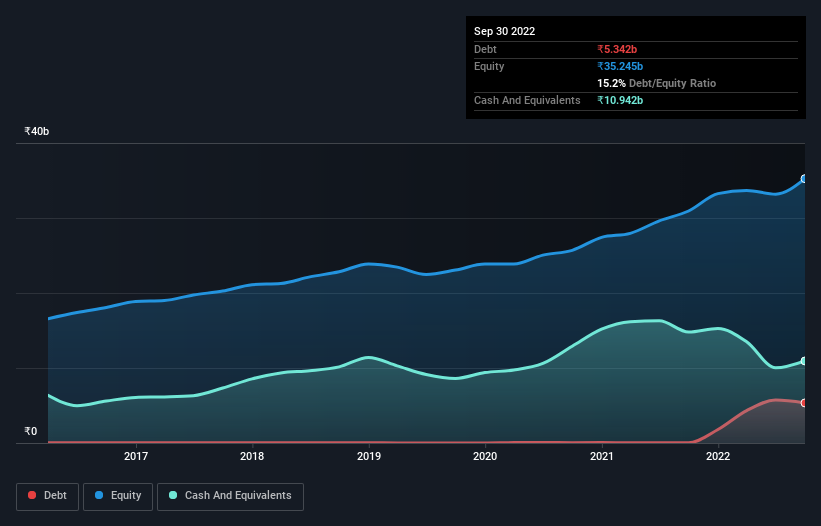We Think Persistent Systems (NSE:PERSISTENT) Can Manage Its Debt With Ease

Legendary fund manager Li Lu (who Charlie Munger backed) once said, 'The biggest investment risk is not the volatility of prices, but whether you will suffer a permanent loss of capital.' It's only natural to consider a company's balance sheet when you examine how risky it is, since debt is often involved when a business collapses. We note that Persistent Systems Limited (NSE:PERSISTENT) does have debt on its balance sheet. But should shareholders be worried about its use of debt?
When Is Debt Dangerous?
Debt assists a business until the business has trouble paying it off, either with new capital or with free cash flow. Part and parcel of capitalism is the process of 'creative destruction' where failed businesses are mercilessly liquidated by their bankers. However, a more frequent (but still costly) occurrence is where a company must issue shares at bargain-basement prices, permanently diluting shareholders, just to shore up its balance sheet. Of course, the upside of debt is that it often represents cheap capital, especially when it replaces dilution in a company with the ability to reinvest at high rates of return. When we examine debt levels, we first consider both cash and debt levels, together.
Check out our latest analysis for Persistent Systems
What Is Persistent Systems's Net Debt?
The image below, which you can click on for greater detail, shows that at September 2022 Persistent Systems had debt of ₹5.34b, up from ₹45.2m in one year. However, its balance sheet shows it holds ₹10.9b in cash, so it actually has ₹5.60b net cash.

How Healthy Is Persistent Systems' Balance Sheet?
The latest balance sheet data shows that Persistent Systems had liabilities of ₹19.4b due within a year, and liabilities of ₹7.43b falling due after that. Offsetting this, it had ₹10.9b in cash and ₹18.0b in receivables that were due within 12 months. So it actually has ₹2.03b more liquid assets than total liabilities.
This state of affairs indicates that Persistent Systems' balance sheet looks quite solid, as its total liabilities are just about equal to its liquid assets. So while it's hard to imagine that the ₹282.8b company is struggling for cash, we still think it's worth monitoring its balance sheet. Simply put, the fact that Persistent Systems has more cash than debt is arguably a good indication that it can manage its debt safely.
On top of that, Persistent Systems grew its EBIT by 53% over the last twelve months, and that growth will make it easier to handle its debt. There's no doubt that we learn most about debt from the balance sheet. But ultimately the future profitability of the business will decide if Persistent Systems can strengthen its balance sheet over time. So if you want to see what the professionals think, you might find this free report on analyst profit forecasts to be interesting.
Finally, while the tax-man may adore accounting profits, lenders only accept cold hard cash. Persistent Systems may have net cash on the balance sheet, but it is still interesting to look at how well the business converts its earnings before interest and tax (EBIT) to free cash flow, because that will influence both its need for, and its capacity to manage debt. During the last three years, Persistent Systems produced sturdy free cash flow equating to 70% of its EBIT, about what we'd expect. This cold hard cash means it can reduce its debt when it wants to.
Summing Up
While it is always sensible to investigate a company's debt, in this case Persistent Systems has ₹5.60b in net cash and a decent-looking balance sheet. And it impressed us with its EBIT growth of 53% over the last year. So is Persistent Systems's debt a risk? It doesn't seem so to us. Above most other metrics, we think its important to track how fast earnings per share is growing, if at all. If you've also come to that realization, you're in luck, because today you can view this interactive graph of Persistent Systems's earnings per share history for free.
If you're interested in investing in businesses that can grow profits without the burden of debt, then check out this free list of growing businesses that have net cash on the balance sheet.
New: Manage All Your Stock Portfolios in One Place
We've created the ultimate portfolio companion for stock investors, and it's free.
• Connect an unlimited number of Portfolios and see your total in one currency
• Be alerted to new Warning Signs or Risks via email or mobile
• Track the Fair Value of your stocks
Have feedback on this article? Concerned about the content? Get in touch with us directly. Alternatively, email editorial-team (at) simplywallst.com.
This article by Simply Wall St is general in nature. We provide commentary based on historical data and analyst forecasts only using an unbiased methodology and our articles are not intended to be financial advice. It does not constitute a recommendation to buy or sell any stock, and does not take account of your objectives, or your financial situation. We aim to bring you long-term focused analysis driven by fundamental data. Note that our analysis may not factor in the latest price-sensitive company announcements or qualitative material. Simply Wall St has no position in any stocks mentioned.
About NSEI:PERSISTENT
Persistent Systems
Provides software products, services, and technology solutions in India, North America, and internationally.
High growth potential with solid track record and pays a dividend.


